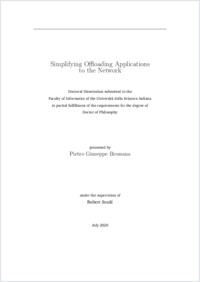Simplifying offloading applications to the network
- Bressana, Pietro Giuseppe
- Soulé, Robert (Degree supervisor)
-
20.07.2020
152 p
Thèse de doctorat: Università della Svizzera italiana, 2020
Software-defined networking
Programmable networks
Hardware-software co-design
Heterogeneous network architectures
Network testing and validation
English
Recent advancements in the networking field have made the data plane fully programmable, thanks to the introduction of both programmable network architectures and network programming languages. P4, the most prominent network programming language, provides software abstractions to the components of PISA, a programmable network architecture that is able to process huge amounts of network traffic, through a pipeline of match-action stages. P4 code can be compiled to several different targets, including programmable network switches and smartNICs. Leveraging network programmability, developers have started offloading a number of different applications to programmable network devices – the so called “In-Network Computing” –, and even hardware devices not intended for network processing have been made programmable through P4. However, programmable networks do not provide adequate tools for developing network applications and do not offer enough compute capabilities for accelerating demanding tasks. Although several research projects have proposed solutions for simplifying the development of applications with network hardware, they are unsuitable for the vast majority of developers, which lack hardware skills. Recent works have explored offloading demanding tasks to programmable network switches. However, these solutions are constrained by the (limited) resources provided by network hardware. This dissertation leverages programmable network devices and hardware-software co-design for providing developers with the tools they need for programming functions in the network as they do with software applications. It also describes a new network compute hierarchy that enables the acceleration of a wider class of applications in the network. We exploit programmable network devices because they offer enough flexibility and visibility into networked applications and we employ hardware-software co-design for overcoming the limitations of both software-only and hardware-only solutions. The solutions proposed in this thesis would greatly help the whole research community both in offloading more complex functions to the network, and in designing more capable programmable network technologies. Our work makes porting software applications to network hardware easy for software developers and provides unprecedented visibility into both network hardware devices and in applications running in the network. It also launches an effort to overcome the limitations of currently available programmable hardware technology, thus providing a direction for future research projects in the field.
- Language
-
- English
- Classification
- Computer science and technology
- License
-
License undefined
- Identifiers
-
- RERO DOC 329024
- URN urn:nbn:ch:rero-006-120690
- ARK ark:/12658/srd1319193
- Persistent URL
- https://n2t.net/ark:/12658/srd1319193
Statistics
Document views: 395
File downloads:
- Texte intégral: 564
